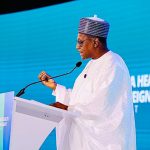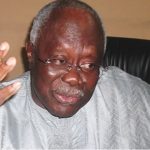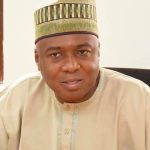President Bola Tinubu has reaffirmed his administration’s commitment to harnessing Nigeria’s human, material, and intellectual resources to drive industrialisation, peace, and prosperity, urging participants of the National Defence College (Course 33) to become “agents of positive national development.” Tinubu made the call on Thursday at the Council Chambers of the State House, Abuja, when he received members of Course 33 of the college.
Special Adviser to the President on Information and Strategy, Bayo Onanuga, revealed details of the meeting in a statement he signed on Thursday titled ‘Inclusive Governance And A Productive Nigeria Is A Collective Responsibility, President Tinubu Tells Participants Of National Defence College.’ He argued that inclusive governance and a productive economy remain a collective duty of the state and citizens Tinubu commended the cohort for patriotism and commitment throughout their programme, pledging platforms for “inclusive solutions” to emerging socio-economic challenges, and reaffirmed support to empower defence and military institutions to produce sufficiently trained officers for a dynamic security environment.
He said, “I congratulate all of you, the leadership of the college, the participants and resource persons. “We are building a political, economic and security future here. We must develop Nigeria. “The strategic path to industrialisation, as enumerated in your presentation, gives credence to that.” He called for increased human capacity development, saying, “I have listened attentively to your presentation. “We must develop future strategic leaders sufficiently equipped with the requisite knowledge and analytical skills necessary to enhance the instrument of national power in a dynamic defence and security environment.” The President said his team would study, for implementation, the cohort’s research paper titled ‘Harnessing Indigenous Manufacturing for Enhanced National Security by Year 2040,’ and challenged participants to sustain rigorous analysis of Nigeria’s emerging challenges. He emphasised that the end-goal is national productivity anchored on inclusion, resilience and discipline.
“It is our joint responsibility to ensure that this nation, Nigeria, is productive, it is governed inclusively, and takes care of the future of our generation yet unborn.” “It is our patriotic duty to look further into the horizon, to be determined and be resilient, to invoke our spirit that can achieve greatness, to train our people, develop our economy, promote industrial development, and ensure that sovereignty is assured, protected, and will remain resilient,” he noted. The President urged continuous benchmarking and curiosity about global best practice, saying the pathway to industrial strength demands learning from peers and outperforming them at home.
He added, “We challenge our intellectual curiosity by being highly inquisitive and looking at what other nations are doing, where we are today, how we got here, and where we are headed tomorrow.” Responding to the college’s request for full development of its permanent site, initiated in 2010, President Tinubu asked the management to be “patient,” hinting that the matter remains on the administration’s agenda. Meanwhile, the Commandant, Rear Admiral A. Ahmed, described the National Defence College, established in 1992, as Nigeria’s highest professional military educational institution.
He said Course 33 ran with the theme, ‘Strengthening Institutions for National Security and Development in Nigeria,’ and comprised 99 participants: 25 from the Army, 16 from the Navy, 12 from the Air Force, five from the Police and 18 from Ministries, Departments and Agencies, alongside 23 international participants from Africa, Asia and South America.
He added that the College has graduated 3,097 participants drawn from the Armed Forces, the Police and friendly African countries. The leader of the research team, Captain M. A. Ahmed, said the course topic aligns with the Renewed Hope Agenda on economic diversification through industrialisation, digitalisation, creativity and manufacturing.
It recommended massive infrastructure investment, product standardization and deliberate patronage of the Defence Industries Corporation of Nigeria to drive industrial and backward integration, with attendant job creation. The presentation concluded with a call for presidential directives to implement Project Native 2040, arguing that visionary leadership and disciplined execution can enable Nigeria to harness indigenous manufacturing for national security and development by 2040.










